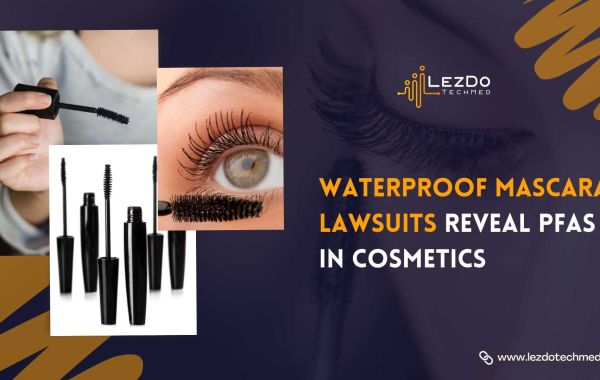https://www.lezdotechmed.com/blog/waterproof-mascara-lawsuits/
Waterproof mascara is celebrated for its long-lasting, smudge-proof results. However, recent studies indicate that many of the cosmetic products contain a dangerous chemical group known as PFAS.
What is PFAS?
PFAS, or perfluoroalkyl and polyfluoroalkyl substances, are synthetic compounds that do not exist in nature. They have practical use in the production of consumer products due to their capacity to repel oil and water.
Often termed 'forever chemicals', PFAS have the unfortunate ability to persist both in the environment and within our bodies due to their unique chemical structure. Long-term exposure to these chemicals can lead to severe health risks, including liver damage, thyroid disease, high cholesterol, and even cancer.
PFAS in Cosmetics:
PFAS have the ability to make cosmetics "wear-resistant," "long-lasting," or "waterproof." A study from the University of Notre Dame tested 231 cosmetic products, including mascara, for the presence of fluorine, a component indicative of PFAS. The results were alarming. Many of the products contained high fluorine levels, particularly those advertised as "long-lasting" or "wear-resistant".
Further detailed analyses confirmed the presence of PFAS in every product scrutinized. Disturbingly, most of these products did not list PFAS on their ingredient labels, making it virtually impossible for consumers to knowingly avoid them. The researchers advocated for stricter regulations and clearer labeling.
The majority of PFAS were discovered in waterproof/long lasting/wear resistant cosmetics, according to the study. It put Revlon, Maybelline, L'Oreal, MAC, Clinique, Rimmel, Covergirl, Estee Lauder, Nars, Urban Decay, Smashbox, and Sephora to the test.
Waterproof Mascara Lawsuits:
Several Waterproof mascara lawsuits have arisen due to these revelations. One notable class-action lawsuit against L’Oréal USA Inc., initiated by Sumner Davenport, accused the company of withholding information about PFAS content in their mascara products.
Davenport had independent lab tests which confirmed the presence of PFAS in several L’Oréal mascaras. While the lawsuit aims to represent affected Californians, it was dismissed without prejudice shortly after filing. Another lawsuit, lodged by Rebecca Vega in New Jersey, similarly charged L'Oreal with failing to disclose the toxic ingredients in its mascara.
Following a 2021 Notre Dame study, third-party tests confirmed the presence of PFAS in several mascaras from brands such as L'Oreal, Maybelline, Cover Girl, Estee Lauder, and others.
Legislative Responses:
In response to these studies and growing public concern, US Senators introduced the "No PFAS in Cosmetics Act", aiming to ban PFAS in cosmetics. The proposed bill mandates the FDA to draft and finalize rules prohibiting the intentional addition of PFAS in cosmetics within a specified period after the act's enactment.
Simultaneously, Canada has begun addressing PFAS concerns in consumer products, focusing on transparency, ingredient listing, and regulatory overhauls to ensure public safety.
The recent findings and subsequent lawsuits regarding PFAS in waterproof mascara have spotlighted the pressing need for transparency and safety in the cosmetics industry. Brands bear the responsibility of ensuring product safety, and regulatory bodies must enforce stringent standards.
Consumers, meanwhile, must stay informed and exercise caution in their product choices, holding manufacturers accountable. The combined efforts of all stakeholders are essential to ensuring a safer and more transparent beauty industry.








